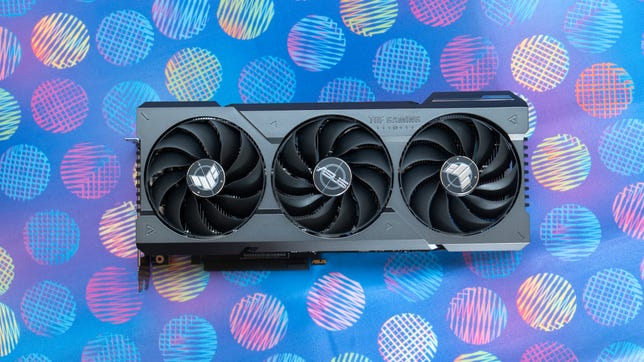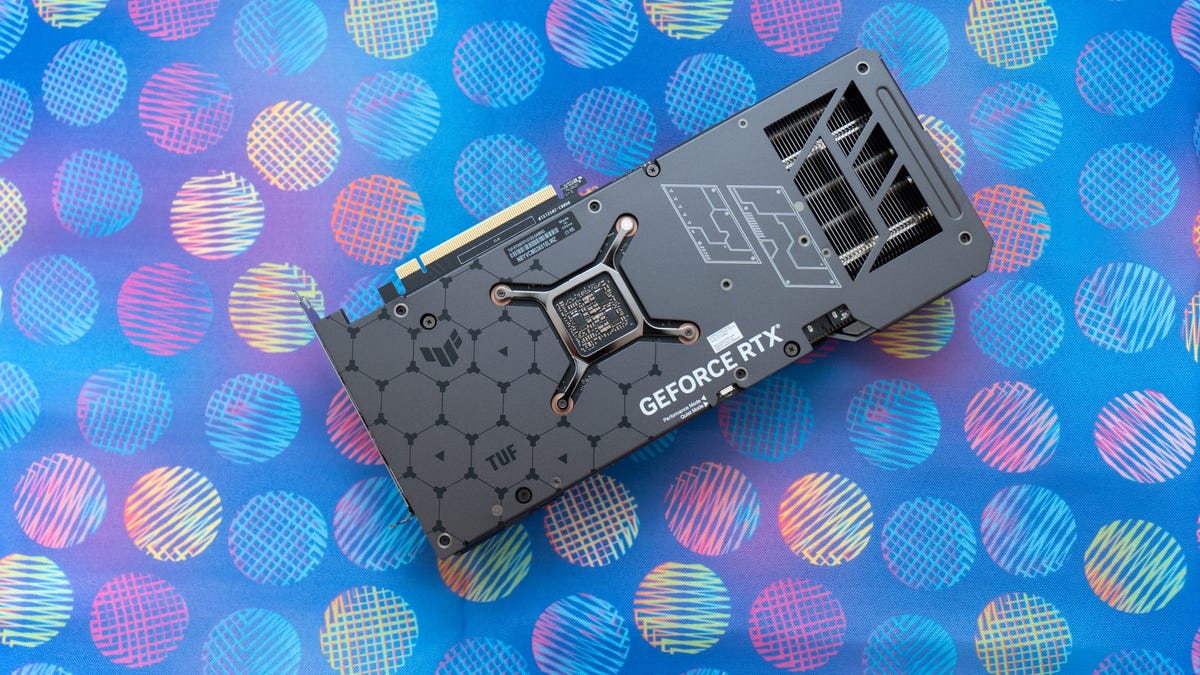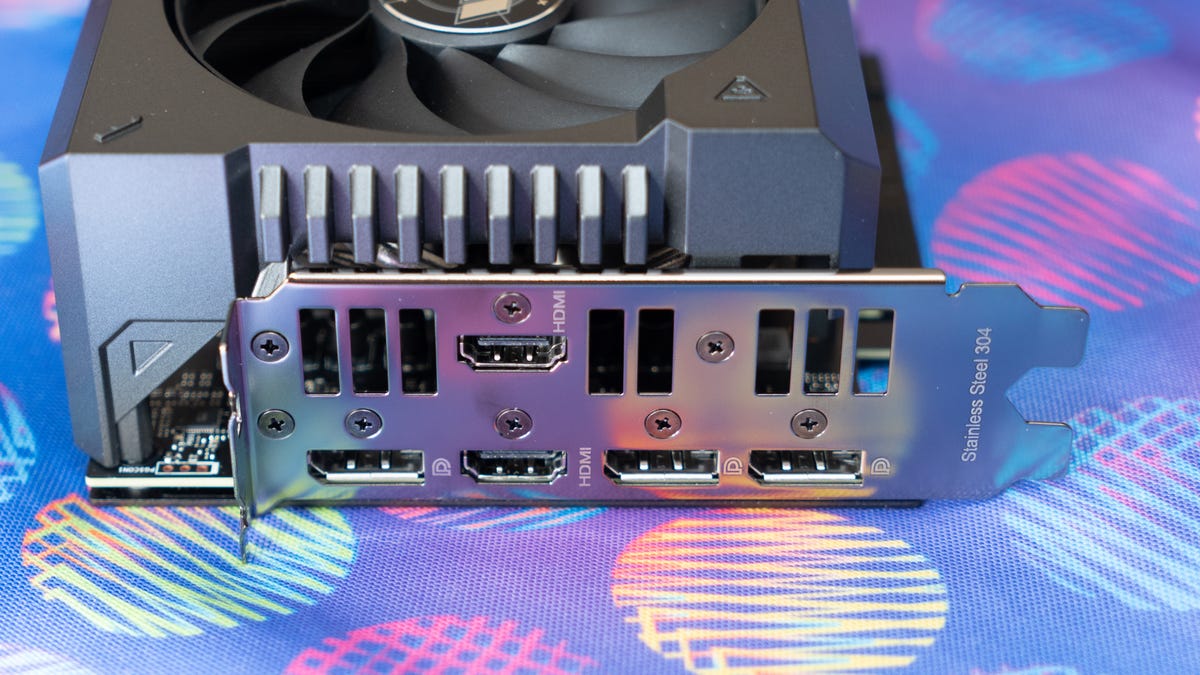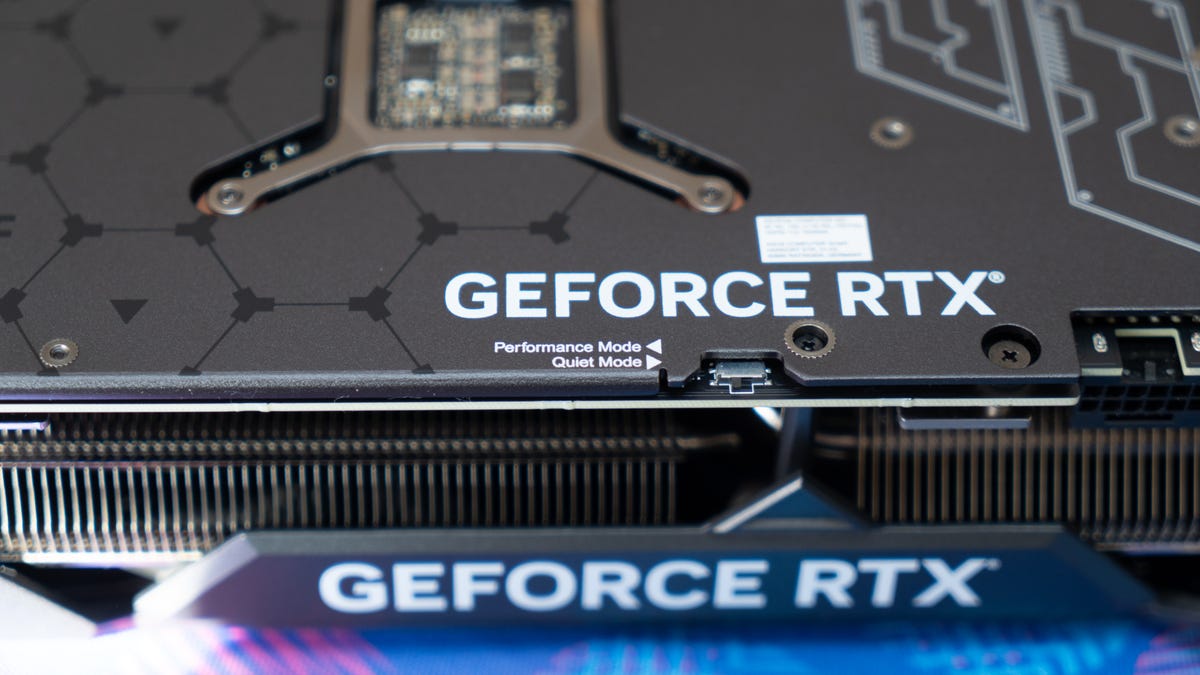
Lori Grunin/CNET
![]()
After a false start as an RTX 4080 variant, Nvidia launched the GeForce RTX 4070 Ti GPU at CES. It’s aimed at gamers looking for maxed-out 1440p and creatives who need the boost Nvidia’s Ada architecture could bring, but who won’t lay out the big bucks the higher-end RTX 4080 and RTX 4090 command. And based on the Asus TUF GeForce RTX 4070 Ti OC version I tested, it triumphs within its price range.
Asus offers four RTX 4070 Ti cards: two ROG Strix, one overclockable, and two TUF, also with one OC model. The prices run from $800 to $1,050, with the TUF version I tested coming in at $850. Nvidia usually offers a home-branded Founders Edition version for this level, leaving the xx60-class cards and below to third-party add-in-board manufacturers, but it’s left the 4070 Ti in the hands of others.

Asus TUF GeForce RTX 4070 Ti OC Edition
Like
- Solid 1440p performance for the money
- Asus includes a GPU support in the box, if you need it
- Two HDMI connectors in addition to 3 DisplayPort
Don’t Like
- Surprisingly big for a xx70-series GPU
- The port connector only covers two slots even though the card occupies the space of 3
- No DP 2.1 support with the Nvidia GPU
I’m not sure how sustainable the pricing is, though. There’s a huge gap between the RTX 4070 Ti and the RTX 4080, which is odd in a market that tends to offer cards priced at small increments. It feels artificially low. While the RTX 4080 unambiguously performs better, the 4070 Ti may seem like a much better value at its nominal price, and it’s not clear whether that will remain true if the prices go up substantially.


Watch this:
Nvidia Debuts RTX 4070 Ti at CES 2023
2:19
If you plan to use DLSS, going with one of the 40-class GPUs makes a lot of sense; DLSS 3 performs significantly better than the previous generation, and I didn’t see any notable artifacts. It’s not clear whether Nvidia will roll out support for DLSS 3 to last-generation cards, but there’s no guarantee that it will work as well on the older hardware.
Asus TUF GeForce RTX 4070 Ti OC specs
| Memory | 12GB GDDR6X |
|---|---|
| Memory bandwidth (GBps) | 504.2 |
| Memory clock (GHz) | 10.5 |
| GPU clock (GHz, base/boost) | 2.3/2.75 |
| Memory data rate/Interface | 21Gbps/192 bits |
| RT cores | 60 |
| CUDA Cores | 7680 |
| Texture mapping units | 240 |
| Streaming multiprocessors | 60 |
| Tensor Cores | 240 |
| Process | 4nm |
| TGP/min PSU | 285/700W |
| Max thermal (degrees) | 194F/90C |
| Bus | PCIe 4.0×16 |
| Size | 3.3 slots; 12 inches (305mm) long x 5.4 inches (138mm) deep |
| Launch price | $850 |
| Ship date | Jan. 5, 2023 |
It delivers a big blow to the AMD Radeon RX 7900 XT; that card is more expensive but for the most part performs the same or worse than the 4070 Ti. And in general its performance falls between the XT and the higher-end, more expensive, RX 7900 XTX. The AMD cards don’t require an adapter for the power cable, but the TUF 4070 Ti includes the requisite dual 8-pin to single 12-pin adapter. It’s fairly unobtrusive and the card shouldn’t require a power supply boost if you’re upgrading a reasonably powerful system.


The flip side.
Lori Grunin/CNET
It’s been a while since I’ve tested an Asus GPU, but I’m generally happy with the build quality. The card operates quietly enough — there’s only so quiet it can get with three fans, but it certainly didn’t out-loud my system fans. Nor did it get too hot, even during stress testing.


It’s got two HDMI connections instead of one, but the DisplayPort is still stuck at version 1.4.
Lori Grunin/CNET
It’s thick for a 4070-class card — it hogs the space of three slots — but because a lot of it is hollow for airflow and ventilation out the back and top, it’s not that heavy. There is a lot of metal, though, for heat dissipation and durability. If it seems to sag a little in your system, Asus includes a handy support-with-screwdriver you can use to prop it up. (I got a little paranoid and stuck it in. Whatever.) There’s an extra HDMI connector for a total of five display ports, but you’re still limited to using only four at a time.
I couldn’t get an updated advance version of Asus’ GPU Tweak utility to play with the overclocking, cooling or other settings, so you might be able to eke further performance out of it. Simply operating in performance mode — the card has a hardware switch to toggle between that and quiet mode — the GPU clock sustained about 2.8GHz, which is better than basic spec but in line with Asus’ OC spec. There wasn’t any boost to the memory clock, though. The utility can also control the lighting, but there isn’t a lot, just RGB for the badge.


The card has a physical switch for performance or quiet modes.
Lori Grunin/CNET
While the 4070 Ti is intended for 1440p gaming, it generally performs well on 4K, too. Unsurprising, since it matches or surpasses the 3080 Ti, which was last year’s performer for mainstream 4K gaming.
I can’t say the Asus TUF OC version of the RTX 4070 Ti is the best implementation around — that requires a lot more testing — but I’m comfortable recommending it as a solid choice for the GPU and for 1440p in general. Even 4K if you’re on a budget. It’s probably not worth it if you’ve got a 3080 Ti and FOMO, but for anything less it’s an upgrade you might want to consider if your current GPU’s performance frustrates you.
Relative performance of recent GPUs
Shadow of the Tomb Raider gaming test (4K)
RTX 3080 Ti
RX 7900 XT
RTX 4070 Ti
RX 7900 XTX
RTX 4080
RTX 4090
Note:
Longer bars indicate better performance (FPS)
Guardians of the Galaxy (1440p at maximum quality with ray tracing)
RX 7900 XT
RX 7900 XTX
RTX 3080 Ti
RTX 4070 Ti
RTX 4080
Note:
Longer bars indicate better performance (FPS)
3DMark Fire Strike Ultra
RTX 3080 Ti
RTX 4070 Ti
RX 7900 XT
RTX 4080
RX 7900 XTX
RTX 4090
Note:
Longer bars indicate better performance
3DMark Time Spy (Graphics score)
RTX 4070 Ti
RX 7900 XT
RTX 4080
RX 7900 XTX
RTX 4090
Note:
Longer bars indicate better performance
3DMark Speed Way (DX12 Ultimate)
RX 7900 XT
RTX 4070 Ti
RX 7900 XTX
RTX 4080
RTX 4090
Note:
Longer bars indicate better performance
3DMark DXR (DirectX Ray Tracing)
RX 7900 XT
RX 7900 XTX
RTX 3080 Ti
RTX 4070 Ti
RTX 4080
RTX 4090
Note:
Longer bars indicate better performance (FPS)
3DMark DLSS 3 vs. DLSS 2 (4K)
No DLSS RTX 4070 Ti
DLSS 2, Quality, RTX 4070 Ti
DLSS 3, Quality, RTX 4070 Ti
DLSS 2, Performance, RTX 4070 Ti
DLSS 3 Performance, RTX 4070 Ti
Note:
Longer bars indicate better performance (FPS)
SpecViewPerf 2020 Medical (4K)
RTX 3080 Ti
RTX 4070 Ti
RTX 4080
RTX 4090
RX 7900 XT
RX 7900 XTX
Note:
Longer bars indicate better performance (FPS)
SpecViewPerf 2020 SolidWorks (4K)
RX 7900 XT
RX 7900 XTX
RTX 4070 Ti
RTX 3080 Ti
RTX 4080 FE
RTX 4090 FE
Note:
Longer bars indicate better performance (FPS)
Test PC configuration
| Custom PC | Microsoft Windows 11 Pro (22H2); 3.2GHz Intel Core i9-12900K; 32GB DDR5-4800; 2x Corsair MP600 Pro SSD; Corsair HX1200 80 Plus Platinum PSU, MSI MPG Z690 Force Wi-Fi motherboard, Corsair 4000D Airflow midtower case |
|---|
